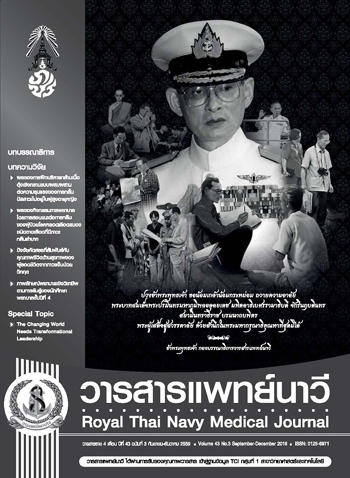ผลของกิจกรรมการพยาบาลโดยการสอนแนะต่อการกลืนของผู้ป่วยโรคหลอดเลือดสมองชนิดขาดเลือดที่มีภาวะกลืนลำบาก
Main Article Content
Abstract
This quasi-experimental study was aimed to examine the effects of a nurse coaching
intervention on swallowing in ischemic stroke patients with dysphagia at the stroke unit in
Chonburi hospital between May and December 2015. Fourty four subjects were purposively
sampled and assigned in the control and experimental group via pair matching with gender,
age and severity of stroke, with a total of twenty two subjects in each group. The experimental
group received a nurse coaching intervention whereas the control group received
routine nursing care. The nurse coaching intervention consisted of individualized session of
rehabilitation for increasing the swallowing of subjects via cargiver’s involvement over 5
days of hospital admission and 2 follow up phone calls after discharge at the end of the
1st week. The nurse coaching session included educational and skill strategies which
consisted of 6 steps: goal setting, analysis, exploration, planning action, learning and feedback.
Data were collected by demographic form, an Ischemic stroke patient swallowing
assessment form and a caregiver ability assessment form. The content validity of the
program and all instruments were verified by five experts and tested for inter-rater reliability
yielding a value of .97 and 1.0. Data were analyzed using descriptive statistics, and hypotheses
were tested with paired t-test and independent t-test.
The findings were as follows:
1. The mean score of swallowing in the experimental group was significantly higher
than before receiving the program (p<.05).
2. After completion of the intervention, the experimental group had a significantly
higher mean score of swallowing than the control group (p<.05).
Article Details

This work is licensed under a Creative Commons Attribution-NonCommercial-NoDerivatives 4.0 International License.
References
2. Perry L, Hamilton S, Williams J, Jones S. Nursing Interventions for Improving Nutritional Status and Outcomes of Stroke Patients: Descriptive Reviews of Processes and Outcomes. Worldviews on Evidence-Based Nursing 2013;10(1):17-40.
3. Heart and Stroke Foundation of Ontario. Management of dysphagia in acute stroke: An educational manual for dysphagia screening professional. Ontario: Foundation; 2006.
4. Langdon C. Dysphagia and respiratory infections in acute ischemic stroke. In Rodriguez JC, editor. Acute Ischemic Stroke. Rijeka: Intech; 2012. p. 79-100.
5. Okubo PC, Fabio SR, Domenis DR, Takayanagui OM. Using the national institute of health stroke scale to predict dysphagia in acute ischemic stroke. Cerebrovasc Dis 2012;33(6):501-7.
6. กมลทิพย์ หาญผดุงกิจ. การฟื้นฟูสมรรถนะผู้ป่วยโรคหลอดเลือดสมอง. กรุงเทพมหานคร:มหาวิทยาลัยมหิดล; 2550.
7. Martino R, Martin R, Black S. Dysphagia after stroke and its management. CMAJ 2012;184(10):1127-8.
8. Geeganage C, Beavan J, Ellender S, Bath M. Interventions for dysphagia and nutritional support in acute and subacute stroke. Cochrane Database Syst Rev 2012.Oct 17;10:CD000323.
9. Jacobsson C, Axelsson K, Wenngren I, Norberg A. Eating despite severe difficulties: assessment of post stroke eating. J Clin Nurs 1996;5(1):23-31.
10. Kumlien S, Axelsson K. Stroke patients in nursing homes: eating, feeding, nutrition and related care. J Clin Nurs 2002;11(4):498-509.
11. เจียมจิต แสงสุวรรณ. โรคหลอดเลือดสมอง การวินิจฉัยและการจัดการทางการพยาบาล. พิมพ์ครั้งที่ 2. ขอนแก่น: โรงพิมพ์ศิริภัณฑ์ออฟเซ็ท; 2541.
12. โรชินี อุปรา, ชลธิชา เรือนคำ, เจนนารา วงศ์ปาลี, เอกชัย กันธะวงศ์. ประสบการณ์ของผู้ให้การดูแลผู้ป่วยโรคหลอดเลือดสมองที่บ้าน. Rajabhat J Sci Humanit Soc Sci 2011;12(2):50-9.
13. Lin C, Wang C, Chen H, Wang G, Chen Y, Wu C. Efficacy of swallowing training for residents following stroke. J Adv Nurs 2003;44(5):469-78.
14. บุญญิสา เมืองทอง. ผลของโปรแกรมส่งเสริมการกลืนต่อความสามารถในการกลืนอย่างปลอดภัยในผู้ป่วยโรคหลอดเลือดสมองที่มีการกลืนลำบาก. [วิทยานิพนธ์พยาบาลศาสตรมหาบัณฑิต สาขาวิชาพยาบาลศาสตร์]. มหาวิทยาลัยสงขลานครินทร์; 2553.
15. Carnaby G, Hankey J, Pizzi J. Behavioral intervention for dysphagia in acute stroke: a randomized controlled trial. Lancet Neurol 2006;5(1):31-7.
16. Hines S, Wallace K, Crowe L, Finlayson K, Chang A, Pattie M. Identification and nursing management of dysphagia in individuals with acute neurological impairment (update). Int J Evid Based Healthc 2011;9(2):148-50.
17. ลัดดา ศิลาเรียม, ธีรนุช ห้านิรัติศัย, สมบัติ มุ่งทวีพงษา. ผลของโปรแกรมการส่งเสริมให้ญาติมีส่วนร่วมในการฟื้นฟูสภาพต่อความสามารถในการกลืนและการรับประทานอาหารของผู้ป่วยโรคหลอดเลือดสมองระยะเฉียบพลัน. พยาบาลสาร 2557;41(ฉบับพิเศษ):180-91.
18. วิราวรรณ คล้ายหิรัญ. ผลของการสอนแนะต่อความพึงพอใจและความสามารถของผู้ดูแลผู้ป่วยโรคหลอดเลือดสมอง. [วิทยานิพนธ์พยาบาลศาสตรมหาบัณฑิต สาขาการพยาบาลผู้ใหญ่]. มหาวิทยาลัยบูรพา; 2544.
19. นพรัตน์ รุจิรารุ่งเรือง. ผลของโปรแกรมการสอนแนะร่วมกับการฝึกการเคลื่อนไหวของร่างกายต่อความสามารถในการปฏิบัติกิจวัตรประจำวันของผู้ป่วยสูงอายุโรคหลอดเลือดสมอง. [วิทยานิพนธ์พยาบาลศาสตรมหาบัณฑิต สาขาการพยาบาลผู้สูงอายุ]. จุฬาลงกรณ์มหาวิทยาลัย; 2551.
20. Burns N, Grove SK. The practice of nursing research conduct, critique, and utilization. 5th ed. St. Louis Missouri: Elsevier Saunders; 2005.
21. Cohen J. Statistical power analysis for the behavioral sciences. 2nd ed. Hillsdale, NJ: Lawrence Earlbaum Associates; 1988.
22. งานกิจกรรมบำบัด ศูนย์สิรินธรเพื่อการฟื้นฟูสมรรถภาพทางการแพทย์แห่งชาติ. แนวทางปฏิบัติในการให้บริการทางกิจกรรมบำบัด สำหรับผู้ที่มีภาวะกลืนลำบากจากโรคหลอดเลือดสมอง. นนทบุรี: ศูนย์สิรินธรเพื่อการฟื้นฟูสมรรถภาพทางการแพทย์แห่งชาติ; 2554.
23. สถาบันประสาทวิทยา, สถาบันวิชาการ. แนวทางการฟื้นฟูสมรรถภาพผู้ป่วยโรคหลอดเลือดสมอง. กรุงเทพมหานคร: สถาบันประสาทวิทยา; 2550.
24. College of audiologists and speech-language pathologists of ontario. Practice standards and guidelines for dysphagia intervention by speech-language pathologists. Toronto: CASLPO; 2007.
25. กาญจนา ขุนทรง. การพยาบาลเพื่อลดการสำลักในผู้ป่วยหลังผ่าตัดสมองที่มีปัญหากลืนลำบาก. [วิทยานิพนธ์พยาบาลศาสตรมหาบัณฑิต สาขาการพยาบาลผู้ใหญ่]. มหาวิทยาลัยมหิดล; 2545.
26. จินนะรัตน์ ศรีภัทรภิญโญ. ผลการสอนและการฝึกปฏิบัติทักษะแก่ผู้ดูแลผู้ป่วยโรคหลอดเลือดสมองต่อความสามารถในการดูแลผู้ป่วยและภาวะสุขภาพของผู้ดูแล. [วิทยานิพนธ์พยาบาลศาสตรมหาบัณฑิต สาขาการพยาบาลผู้ใหญ่]. มหาวิทยาลัยมหิดล; 2540.
27. ประกอบพร ทิมทอง. ปัจจัยที่มีความสัมพันธ์กับความสามารถของผู้ดูแลผู้ป่วยโรคหลอดเลือดสมอง. [วิทยานิพนธ์พยาบาลศาสตรมหาบัณฑิต สาขาการพยาบาลผู้ใหญ่]. มหาวิทยาลัยบูรพา; 2550.
28. Eaton J, Johnson R. Coaching successfully. London: Dorling Kindersly Books; 2001.
29. ทิพย์สุดา ชำนาญศรีเพ็ชร์. ผลของการพยาบาลตามแนวปฏิบัติการพยาบาลต่อการกลืนอย่างปลอดภัยในผู้ป่วยโรคหลอดเลือดสมองที่มีภาวะกลืนลำบาก. [วิทยานิพนธ์พยาบาลศาสตรมหาบัณฑิต สาขาการพยาบาลผู้ใหญ่]. มหาวิทยาลัยมหิดล; 2545.
30. Vale MJ, Jelinek MV, Best JD, Dart AM, Grigg LE, Hare DL, et al. Coaching patients OnAchieving Cardiovascular Health (COACH): a multicenter randomized trial in patients with coronary heart disease. Arch Intern Med 2003;163(22):2775-83.
31. Wolever RQ, Dreusicke M, Fikkan J, Hawkins TV, Yeung S, Wakefield J, et al. Integrative health coaching for patients with type 2 diabetes: a randomized clinical trial. Diabetes Educ 2010;36(4):629-39.


